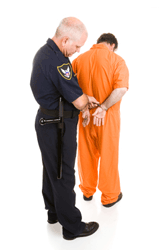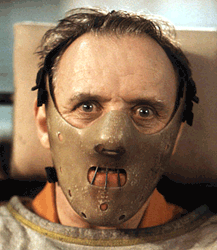Naked in the Public Square
 I prefer the word “prisoner” to “inmate.” “Inmate” denotes a sort of complacency about one’s loss of freedom – a sort of neutral personal choice like “roommate” or “classmate.” Being a prisoner is not always a result of one’s choices.Prison is often both physically and emotionally uncomfortable. People who know me have pointed out that I seldom complain about the indignities visited upon all prisoners. I tend not to see things in terms of myself, and I don’t like complaining. I never really understood what purpose it serves.It’s axiomatic in prison that “inmates” expend vast amounts of energy complaining about the food, the attitudes of guards – or “corrections officers” as they prefer to be called – and the constant rumors of draconian steps by prison officials to take away what little we have. All prisoners have a sort of hierarchy of the personal indignities they most disdain.I think my hierarchy is organized a bit differently than most. I can cope with almost any humiliation or living condition. At the end of the day, I offer up whatever I have faced that day. Some things are more painful to me, but that is largely because I continue to hold onto some dignity, or pride – or both. I think dignity is a good thing, but pride, its moodier cousin, is self-defeating.
I prefer the word “prisoner” to “inmate.” “Inmate” denotes a sort of complacency about one’s loss of freedom – a sort of neutral personal choice like “roommate” or “classmate.” Being a prisoner is not always a result of one’s choices.Prison is often both physically and emotionally uncomfortable. People who know me have pointed out that I seldom complain about the indignities visited upon all prisoners. I tend not to see things in terms of myself, and I don’t like complaining. I never really understood what purpose it serves.It’s axiomatic in prison that “inmates” expend vast amounts of energy complaining about the food, the attitudes of guards – or “corrections officers” as they prefer to be called – and the constant rumors of draconian steps by prison officials to take away what little we have. All prisoners have a sort of hierarchy of the personal indignities they most disdain.I think my hierarchy is organized a bit differently than most. I can cope with almost any humiliation or living condition. At the end of the day, I offer up whatever I have faced that day. Some things are more painful to me, but that is largely because I continue to hold onto some dignity, or pride – or both. I think dignity is a good thing, but pride, its moodier cousin, is self-defeating.
Two months ago I was awakened by a guard at 5:30 AM and told to dress quickly and report to the prison’s transportation office. The guard would take no questions. There was a cloud of doom and gloom over as I walked the short distance. Being sent to transportation can mean anything from a medical consult to transfer to another prison. The latter is every prisoner’s nightmare.
By 6 AM, I was locked into another cell with four other men, none of whom had any idea where they were going. There was no place to sit so I stood at the cell bars in the tiny, crowded room. After an hour, I heard a guard in the distance say, “MacRae’s going on a med run.” I relaxed a bit. A “med run” is a medical consult or procedure arranged by the prison doctor with an outside medical facility. It was only the second time in fifteen years I was taken out of the prison for a med run.After an hour standing at the cell bars, two guards appeared carrying all the adornments a prisoner must wear on a field trip. A thick leather restraint was placed tightly around my waist, and my wrists were locked into fixed shackles on the restraint so my hands were immobilized at my waist. As is inevitable whenever that happens, my nose immediately began to itch. I found it difficult to breath in the tight, heavy restrains. I hoped we were not going very far.Led to the back of a prison van into what seemed like a cage built inside, my handlers spoke not a single word to me. I could see very little out the grill work of the cage, but after about 20 minutes, I spotted a sign for Catholic Medical Center in Manchester, one of two Catholic hospitals in New Hampshire.As I was led into the lobby with all my prison hardware clinking and the two armed guards at my sides, I felt the cold stares of dozens of wary eyes upon me. There had been a lot of idle chatter in the bustling hospital lobby, but everyone suddenly fell silent as I was led through their midst feeling…well…like a prisoner. I tried to stare straight ahead, a tactic that was not as easy as the silence quickly evolved into a torrent of whispers. I thought I even heard a gasp or two. As we proceeded across the lobby toward the bank of elevators, we paused while a guard went to retrieve some paperwork.
At the elevators, the remaining guard turned me around 180 degrees to face the wall instead of the field of eyes. I felt grateful for this, but then I heard another gasp. The guard quickly looked at me, and I realized the gasp was my own. As I stood facing the wall in my prison garb and chains and shackles and leather restraints, I found myself face to face with a smiling portrait of my bishop.
It was a short visit. I was whisked around again by the guards as two elevators opened simultaneously, and they steered me into the less crowded one. I could feel the discomfort of the few people in the elevator. Everyone but the guards and me got off on the next floor. I wondered if that was really where they were going. Despite all the hardware, I felt naked.In the patient waiting area, an elderly woman smiled at me from across the room. I tried to smile back. I was trying hard not to look like Hannibal Lecter. All the restraints were removed for the medical procedure which took only minutes. Putting them all back on again took longer than the procedure. The journey out of the hospital seemed much shorter than the route in. With my hands immobilized in front of me, I spoke a brief prayer for my bishop as we passed his portrait, my chains clinking in rhythm with our steps.I was back in my cell having instant coffee by 9:30. It was nice to have all that hardware off. I sat and stared out my cell window for awhile. I felt profoundly, inexplicably sad. It did not last long – just long enough for me to assess the difference between dignity and pride.(With apologies to my friend, Fr. Richard John Neuhaus whose seminal work The Naked Public Square identified him as America’s brightest and clearest theological thinker. May he rest in peace. Amen.)
All the restraints were removed for the medical procedure which took only minutes. Putting them all back on again took longer than the procedure. The journey out of the hospital seemed much shorter than the route in. With my hands immobilized in front of me, I spoke a brief prayer for my bishop as we passed his portrait, my chains clinking in rhythm with our steps.I was back in my cell having instant coffee by 9:30. It was nice to have all that hardware off. I sat and stared out my cell window for awhile. I felt profoundly, inexplicably sad. It did not last long – just long enough for me to assess the difference between dignity and pride.(With apologies to my friend, Fr. Richard John Neuhaus whose seminal work The Naked Public Square identified him as America’s brightest and clearest theological thinker. May he rest in peace. Amen.)